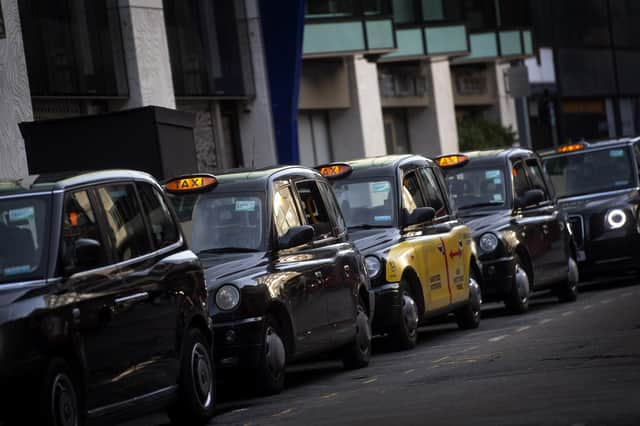Limited wheelchair accessible taxis or private hire vehicles in Tyne and Wear


More than four in five taxis and private hire vehicles in Tyne and Wear cannot be used by people in wheelchairs, figures reveal.
With just one in seven vehicles across England and Wales suitably equipped, disability charity Scope said everyday inequality is rife – even for the nation's returning Paralympic heroes.
Advertisement
Hide AdAdvertisement
Hide AdDepartment for Transport figures show 5,033 vehicles were licensed to operate in Tyne and Wear at the end of March – but just 693 (14%) could be used by those in wheelchairs.
Of the 1,424 traditional taxis which can be hailed from the street, only 618 (43%) were wheelchair accessible.
And just 75 (2%) of the area's 3,609 private hire vehicles, which need to be pre-booked, offered the same service.
Across England, just 2% of private hire vehicles, such as those available through Uber, can fit a wheelchair in them.
Advertisement
Hide AdAdvertisement
Hide AdThough the proportion of taxis or hackney carriages which can do the same is much higher, it fell from 57% to 54% over the last year.
All traditional taxis are wheelchair accessible in London and some other parts of the country, but other areas have none at all.
Scope said four-fifths of disabled people feel anxious on public transport – with the coronavirus pandemic only exacerbating this – leaving many reliant on taxis and PHVs.
Tom Marsland, policy manager for consumer affairs at the charity, said: "When these aren't accessible disabled people are robbed of their independence.
Advertisement
Hide AdAdvertisement
Hide Ad"Consistent regulation and enforcement across all transport authorities in England and Wales would help hold drivers and taxi organisations accountable for their accessibility, and improve disabled people's trust in the system."
Mr Marsland said the Paralympic Games – which conclude on Sunday (September 5) – have sent a powerful message to the world, but warned that all disabled people still face daily inequality on public transport.
He added: "We must not miss the opportunity to turn Paralympic cheers into change and create an equal and fair society."
The DfT figures also show that the majority of local authorities across England and Wales do not require disability awareness training for taxi or private hire drivers.
Advertisement
Hide AdAdvertisement
Hide AdThe National Private Hire and Taxi Association said wheelchair accessible vehicles are expensive to buy and run, and their higher emissions are worse for the environment.
Steven Toy, NPHTA board member, said: "With the increase in the number of journeys being taken by peer-to-peer apps, there are fewer journeys by hackney carriage.
"That itself dissuades people from investing in a vehicle when they see their trade falling on the whole."
He added that for every WAV request, there are likely to be 10 or more for a low vehicle – favoured by older people who struggle to get into higher vehicles – so all disabilities should be taken into consideration.
Advertisement
Hide AdAdvertisement
Hide AdA DfT spokeswoman said: “Our National Disability Strategy will drive forward new laws to ensure disabled people get the right help in taxis and private hire vehicles.
“All councils should be using existing powers to provide enough wheelchair accessible vehicles and ensuring all drivers are trained to support every disabled passenger.”